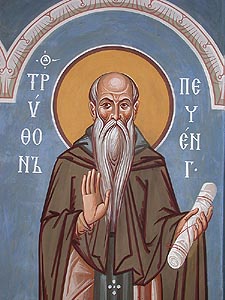Venerable Tryphon, Abbot of Pechenga

Saint Tryphon of Pechenga and Kola (Mētrophánēs in the world), was born in the Novgorod governia into a priestly family. The pious parents raised their son in the fear of God. From his early years Tryphon had resolved to devote his life to apostolic deeds and to go to the pagan Laplanders to proclaim the Gospel of Christ. He had heard of them only through the accounts of fish vendors.
Once, while praying in the forest he had heard a voice, “Tryphon, this is not your place. An inhospitable and thirsting land awaits you.” Forsaking his parental home, the Saint went out to the Kola Peninsula and halted on the banks of the Pechenga River, where the Lapps lived. There he began to trade with them. First the Saint acquainted himself with the pagan beliefs of those people and studied their language, and then he began to preach the Christian Faith to them. The Lapps listened to his words with great mistrust. He suffered many hardships, enduring hostility and even beatings. But gradually, through his wise and kindly words and meekness, many were converted to Christ.
With the blessing of Archbishop Makarios of Novogord, Saint Tryphon and Saint Theodóretos (August 17) built a church for the new converts. In 1532 he founded the Pechenga-Trinity Monastery for those who were zealous for the monastic life, “on the cold sea, on the frontier of Murmansk.”
Tsar Ivan the Terrible helped him and richly endowed the Monastery. The Enlightener of the Lapps went to the Lord in 1583 at the age of 98, after living in Lapland for almost 70 years. Local veneration of Saint Tryphon began soon after his death.
The Swedes destroyed Pechenga Monastery in 1589, but the Saint's burial place under the altar was not forgotten. In 1708-1709 the Sretensky church was built here, around which the Monastery was revived in 1886. The church was destroyed again in 1944, but after the restoration of the Monastery in 2009-2012 a new church was built over the Saint's relics.
Those who invoke Saint Tryphon with faith have received his miraculous help. Even during his lifetime he rescued shipwrecked sailors, calmed storms at sea, and healed those who suffered from deafness, blindness, and paralysis.
